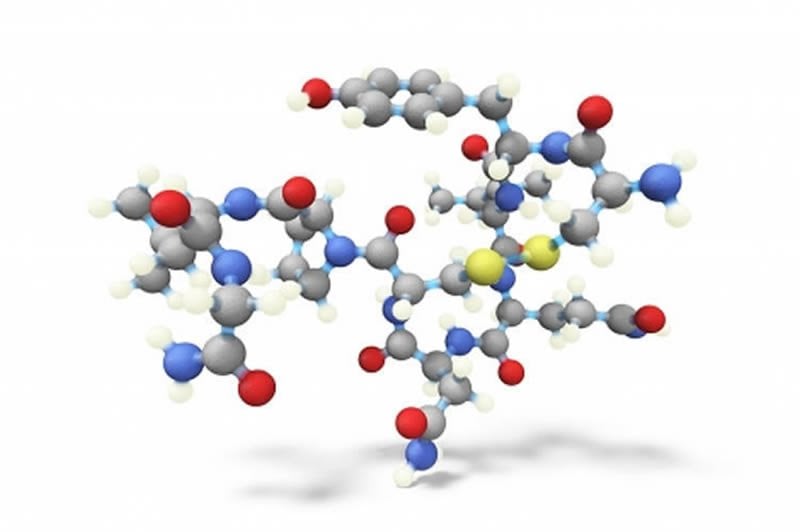Summary: Male patients on the autism spectrum who were given oxytocin for four weeks experienced improvements in social attachment behaviors for up to 12 months.
Source: KU Leuven
A team led by Professor Kaat Alaerts (KU Leuven) recruited 40 adult men with autism spectrum disorder to take part in their study.
“In a first stage, we examined the amount of oxytocin produced by the participants themselves. The subjects also filled out several questionnaires,” Professor Alaerts explains. “An analysis of the data revealed that the amount of oxytocin found in the subjects’ saliva was inversely related to their self-reported attachment issues.”
In a second stage of the research, the team examined the long-term effects of administering oxytocin through a nasal spray. This experiment produced remarkable results: the participants who had been given oxytocin for four weeks experienced positive effects until up to a year later.
Less repetition, more attachment
“We divided the 40 participants into an experimental group and a control group. The control group received a placebo for four weeks,” says doctoral student Sylvie Bernaerts, who is the first author of the study in Molecular Autism.
“Over the course of a full year, we also asked the participants to fill out questionnaires on four different occasions. These questionnaires were used to examine the impact of the oxytocin-containing nasal spray on the symptoms of autism.”
In terms of social interaction, the researchers found no difference between the experimental group and the control group. But for repetitive behaviour (including the need for routines) and attachment, the results were significant: “The people in the experimental group reported far less repetitive behaviour and also reported fewer problems with forming close relationships.”
This study shows for the first time what the long-term effects are of repeatedly administering oxytocin to people with autism. Professor Alaerts:
“Participants who took oxytocin every day for four weeks experienced positive effects until up to a year later. That’s a remarkable result.”
Further research necessary
For this study, the scientists only selected male participants. This was partly because autism is more prevalent in men, and women’s hormonal cycle may influence the test results. Furthermore, oxytocin is already being used to induce labour or breastfeeding in pregnant women or women who have recently given birth, respectively. In other words, there are more factors to take into account in female test subjects.

And what about using oxytocin as a treatment? “As oxytocin is already being used in medicine, you might think that we can start using it quite soon to address attachment issues or to reduce repetitive behaviour in people with autism,” says Professor Alaerts. But she is quick to temper expectations: “The findings we’re presenting today are the result of a first pilot study. A lot of further research needs to be done before oxytocin can be used to treat people with autism.”
This research was conducted in collaboration with Professor Jean Steyaert, head of the Leuven Autism Research Consortium, and was funded by the Branco Weiss Fellowship (ETH Zürich), the Marguerite-Marie Delacroix Foundation and Research Foundation – Flanders (FWO).
Source:
KU Leuven
Media Contacts:
Kaat Alaerts – KU Leuven
Image Source:
The image is in the public domain.
Original Research: Open access
“Behavioral effects of multiple-dose oxytocin treatment in autism: a randomized, placebo-controlled trial with long-term follow-up”. Sylvie Bernaerts, Bart Boets, Guy Bosmans, Jean Steyaert & Kaat Alaerts.
Molecular Autism doi:10.1186/s13229-020-0313-1.
Abstract
Behavioral effects of multiple-dose oxytocin treatment in autism: a randomized, placebo-controlled trial with long-term follow-up
Background
Intranasal administration of the “prosocial” neuropeptide oxytocin is increasingly explored as a potential treatment for targeting the core characteristics of autism spectrum disorder (ASD). However, long-term follow-up studies, evaluating the possibility of long-lasting retention effects, are currently lacking.
Methods
Using a double-blind, randomized, placebo-controlled, parallel design, this pilot clinical trial explored the possibility of long-lasting behavioral effects of 4 weeks of intranasal oxytocin treatment (24 International Units once daily in the morning) in 40 adult men with ASD. To do so, self-report and informant-based questionnaires assessing core autism symptoms and characterizations of attachment were administered at baseline, immediately after 4 weeks of treatment (approximately 24 h after the last nasal spray administration), and at two follow-up sessions, 4 weeks and 1 year post-treatment.
Results
No treatment-specific effects were identified in the primary outcome assessing social symptoms (Social Responsiveness Scale, self- and informant-rated). In particular, with respect to self-reported social responsiveness, improvements were evident both in the oxytocin and in the placebo group, yielding no significant between-group difference (p = .37). Also informant-rated improvements in social responsiveness were not significantly larger in the oxytocin, compared to the placebo group (between-group difference: p = .19). Among the secondary outcome measures, treatment-specific improvements were identified in the Repetitive Behavior Scale and State Adult Attachment Measure, indicating reductions in self-reported repetitive behaviors (p = .04) and reduced feelings of avoidance toward others (p = .03) in the oxytocin group compared to the placebo group, up to 1 month and even 1 year post-treatment. Treatment-specific effects were also revealed in screenings of mood states (Profile of Mood States), indicating higher reports of “vigor” (feeling energetic, active, lively) in the oxytocin, compared to the placebo group (p = .03).
Conclusions
While no treatment-specific improvements were evident in terms of core social symptoms, the current observations of long-term beneficial effects on repetitive behaviors and feelings of avoidance are promising and suggestive of a therapeutic potential of oxytocin treatment for ASD. However, given the exploratory nature of this pilot study, future studies are warranted to evaluate the long-term effects of OT administration further.
Trial registration
The trial was registered with the European Clinical Trial Registry (Eudract 2014-000586-45) on January 22, 2014 (https://www.clinicaltrialsregister.eu/ctr-search/trial/2014-000586-45/BE).






